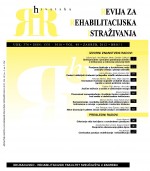SELF-CONCEPT AND SOCIAL SUPPORT AMONG ADOLESCENTS WITH DISABILITIES ATTENDING SPECIAL AND MAINSTREAM SCHOOLS
SELF-CONCEPT AND SOCIAL SUPPORT AMONG ADOLESCENTS WITH DISABILITIES ATTENDING SPECIAL AND MAINSTREAM SCHOOLS
Author(s): Manca Seničar, Darja Kobal GrumSubject(s): Educational Psychology, Inclusive Education / Inclusion
Published by: Sveučilište u Zagrebu, Edukacijsko-rehabilitacijski fakultet
Keywords: self-concept; self-esteem; social support; special needs; special education; inclusive education;
Summary/Abstract: The main research goal was to investigate the self-concept, self-esteem and social support among adolescents with special needs, concentrating on the differences between adolescents who are attending regular schools and those who receive their education in special institutions. Participants filled in three questionnaires: Self-description Questionnaire (Marsh, 1992), Self-Liking/Competence Scale (Tafarodi and Swann, 2001) and Child and Adolescent Social Support Scale (Malecki, Demaray and Elliott, 2000). The results show that the educational institution and type of disability affect students ’self-concept, self-esteem and social support, while parents’ disability only has a minor influence on these characteristics. Positive correlations between types of self-concept and social support can also be observed. The results therefore show inclusion’s positive effect on students ’ personal and social functioning: students attending inclusive education have better self-concepts and receive more social support than students attending special schools.
Journal: Hrvatska revija za rehabilitacijska istrazivanja
- Issue Year: 48/2012
- Issue No: 1
- Page Range: 73-83
- Page Count: 11
- Language: English

